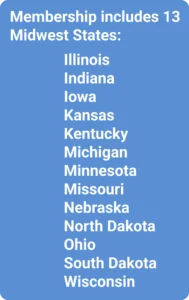
MEEA: A Trusted Source on Energy Efficiency
March 14, 2025
The Midwest Energy Efficiency Alliance (MEEA) is a regional non-profit organization and collaborative network, promoting energy efficiency to optimize energy generation, reduce consumption, and create jobs in all Midwest communities. Energy efficiency touches all communities in the Midwest, and its advancement has proven to have positive effects on the economy, jobs, health, and safety within those communities. MEEAworks closely with various stakeholders like utilities, business partners, academics, federal and state governments, cities and municipalities, and community-based organizations to ensure access and education for all.
Midwest, and its advancement has proven to have positive effects on the economy, jobs, health, and safety within those communities. MEEAworks closely with various stakeholders like utilities, business partners, academics, federal and state governments, cities and municipalities, and community-based organizations to ensure access and education for all.
Energy Sciences has been a member of MEEA for many years, attending networking events and webinars. We sat down with Jen Rhodes, MEEA’s Director of Membership & External Relations, to gain insight into the instrumental work they are doing and to share member resources. Jen has spent her career in the non-profit space and was excited to move into the energy efficiency space when the position opened at MEEA. “I don’t see myself working in any other industry after this because it’s truly such an important topic and it’s something that touches every single person, whether it’s a large industrial company or a homeowner,” Jen shared.
MEEA touches a wide breadth of areas when it comes to energy efficiency. Based on their deep understanding of their members’ specializations, they are able to make connections to help members collaborate on projects and share expertise.
Their work mainly revolves around three areas:
- Policy Advocacy for Energy Efficiency
Both at the state and federal level, it’s important that people on both sides of the aisle see the advantages of energy efficiency. MEEA works to be a resource to legislators and regulators to ensure they have the information they need to make decisions and help connect them with other industry experts..
2. Building Energy Codes and Building Standards
MEEA supports the development and adoption of building energy codes and compliance of existing energy codes and building standards, advocating for an efficient building envelope first and foremost. They also offer monthly newsletters on policy and code updates to keep members informed.
3. Program Delivery Support
Providing technical assistance, workforce development initiatives, market research, and stakeholder outreach are among the ways MEEA supports in utility program delivery. MEEA works collaboratively, supplementing their members’ work in the industry whenever possible.
In addition to the MEEA team’s expertise and passion, a focus on connection is one of their greatest strengths that significantly increases their impact. MEEA calls for its members to work together on knowledge sharing, advocacy, and collaborative program development, and provides networking opportunities that enables members to build the relationships to do that work. To Jen, this collaboration has a large effect on the end product. With that in mind, MEEA also provides opportunities for members to join committees, working groups and other spaces that create environments for productive conversation. “We always get to a more comprehensive solution when there is the proper type of collaboration,” Jen explained.
With any industry, there are roadblocks and opportunities. Energy Efficiency sees a unique set of challenges currently due to rapid advancements in technology and continually evolving policy. MEE keeps up with the latest developments, like demand response and distributed energy resources, as things that used to be more prevalent are phased out. MEEA has created a strong system of educational resources that has helped keep themselves and their members up to date on the latest and greatest in energy efficiency information.
“We see ourselves as a resource. Members often come to us and ask about a specific topic regarding energy efficiency, usually an overview for their team. We have a conversation to see what type of information they want their team to know, the information that they need to do their business or onboard new team members.”
Whether you are a seasoned professional in the energy efficiency space, a policy leader, a local official, or a community-based organization, MEEA has information and resources for you. We look forward to continuing to work with MEEA for years to come and we invite you to check them out if you are not already a member. They also have a number of free resources you can take advantage of if a membership is not in the cards at the moment. Together we can continue to share the vast benefits of energy efficiency.
Check out their website to learn more about the work they do, general information on energy efficiency and codes, specialty training classes for real estate professionals and building operators, and to learn more about becoming a member.
We appreciated Jen taking the time to talk with us about all the work MEEA is doing. We also picked her brain on what it was like to join the energy efficiency industry. We also thought readers who may be interested in transitioning to the industry would be interested in hearing what skills were helpful during the transition. Project management, curiosity, willingness to learn, personable, and flexibility were the main skills noted. A new job in energy efficiency doesn’t need to be a huge pivot. Many roles in this industry just take a good attitude and friendly spirit.





